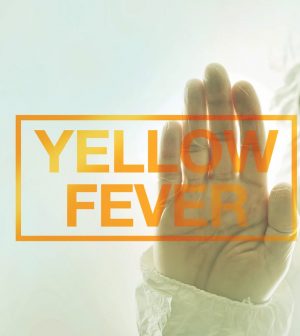- Could Your Grocery Store Meat Be Causing Recurring UTIs?
- Are You Making This Expensive Thermostat Error This Winter?
- Recognizing the Signs of Hypothyroidism
- 10 Strategies to Overcome Insomnia
- Could Artificial Sweeteners Be Aging the Brain Faster?
- Techniques for Soothing Your Nervous System
- Does the Water in Your House Smell Funny? Here’s Why
- Can a Daily Dose of Apple Cider Vinegar Actually Aid Weight Loss?
- 6 Health Beverages That Can Actually Spike Your Blood Sugar
- Treatment Options for Social Anxiety Disorder
This Travel Season, Know Your Risks for Yellow Fever

If tropical lands like South America or Africa are your travel destinations, getting yourself protected against yellow fever before you go is imperative, an expert says.
What is yellow fever? According to Dr. Jill Weatherhead, an assistant professor of tropical medicine and infectious diseases at Baylor College of Medicine in Houston, it’s a viral illness endemic to tropical zones that’s spread to humans through the bites of infected mosquitos.
Most folks bitten and infected may not show any symptoms. But others will develop symptoms within a week of the bite.
“These symptoms include fever, chills, headaches, back pain and myalgias [aches],” Weatherhead said in a Baylor news release.
In some people, “the virus can progress to severe disease,” she added. “One in seven people will develop severe yellow fever, which includes high fever or jaundice, which is the yellowing of the skin that is associated with inflammation of the liver or hemorrhagic shock where bleeding can happen.”
For folks unfortunate to develop full-blown disease, there’s very little doctors can do since no known antiviral is effective against the illness. The best that can be done is what health care workers call “supportive care.”
There are two key methods of preventing yellow fever before it starts, however: Vaccination and mosquito avoidance.
“A yellow fever vaccine is available and recommended for all persons nine months and older traveling to yellow fever-endemic regions, with some exceptions,” Weatherhead said. “Additionally, some countries might require you to have the vaccination before you enter, and there may be some restrictions on going into a country if you have been to a yellow fever-endemic area.”
Once in an area where mosquitoes carrying the yellow fever virus might be found, a few simple steps can help you avoid getting bitten. They’re basically the same measures you would use back home: wear long sleeves and long pants and use a bug repellant with DEET.
If you find yourself infected with yellow fever, “make sure you are hydrated and are controlling your fevers to help alleviate symptoms,” Weatherhead said. “Acetaminophen would be the medication of choice. Avoid using anti-inflammatories like aspirin and other NSAIDs that could impact your platelets. Seeking medical care as soon as possible can be lifesaving.”
SOURCE: Baylor College of Medicine, news release, June 6, 2024
Source: HealthDay
Copyright © 2026 HealthDay. All rights reserved.










